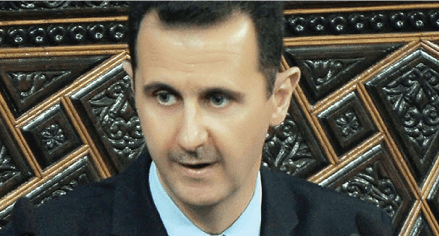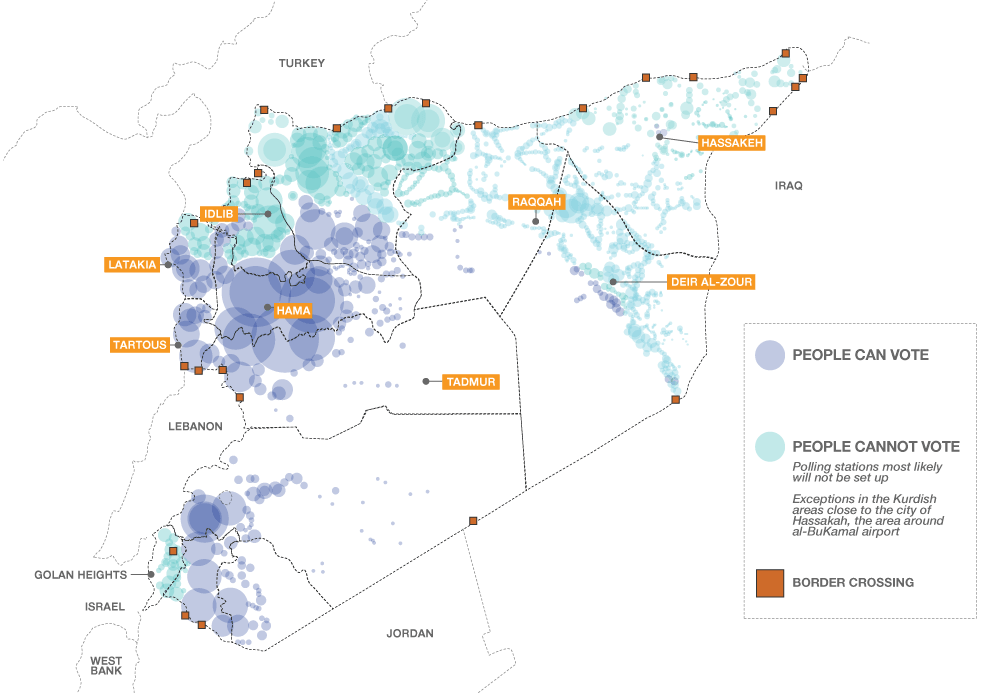For the first time in four decades, the ballots in Syria’s election will not just have “yes” or “no” options to tick. This time, Syrians are choosing among three names. Two other candidates will run against incumbent President Bashar al-Assad, as part of the constitutional changes that he has instituted during the three-year uprising.
The presidential vote is set to take place as the regime continues to battle rebels in different parts of the country.
For many Syrians, there is a surrealist element to holding a presidential poll in a country where every day there are hundreds of casualties.
Scheduled for June 3, the national vote will not be available nationwide: The government will not be able to set up ballot boxes in most towns located in the country’s north and east. Nor does it control some areas just a few kilometres from the capital, Damascus, in addition to most of Deraa province in the south of the country.
But the mere holding of the election is a sign of defiance on Assad’s part. Calls by the international community for him to step
down and fierce fighting between his troops and the rebels have not deterred Assad from holding the elections in an attempt to legitimise his government.
The presidential vote is set to take place as the regime continues to battle rebels in different parts of the country.
For many Syrians, there is a surrealist element to holding a presidential poll in a country where every day there are hundreds of casualties.
Scheduled for June 3, the national vote will not be available nationwide: The government will not be able to set up ballot boxes in most towns located in the country’s north and east. Nor does it control some areas just a few kilometres from the capital, Damascus, in addition to most of Deraa province in the south of the country.
But the mere holding of the election is a sign of defiance on Assad’s part. Calls by the international community for him to step
down and fierce fighting between his troops and the rebels have not deterred Assad from holding the elections in an attempt to legitimise his government.
Syria's constitution, ratified in 2012, allows the president to run for a seven-year term, which can be renewed once. Syria’s president is vested with sweeping powers. He can dismiss the prime minister and other members of the cabinet and also has the right to dissolve the parliament. The president is also the head of the Syrian army and can dismiss military officers. His authority may be delegated, at his sole discretion, to his vice president.
Click on the tabs for more information
A law adopted by the Syrian parliament in early 2014 restricted candidacy to individuals who have lived in Syria for the
past 10 years, thereby preventing exiled opposition figures from running. A total of 24 candidates, including two women and
a Christian, submitted applications to the Supreme Constitutional Court for the presidency.
Of these, three candidates met all the conditions to run, including having the support of 35 members of parliament.
past 10 years, thereby preventing exiled opposition figures from running. A total of 24 candidates, including two women and
a Christian, submitted applications to the Supreme Constitutional Court for the presidency.
Of these, three candidates met all the conditions to run, including having the support of 35 members of parliament.
Bashar al-Assad is the most, if not the only, significant candidate in the 2014 election. He has ruled the country since 2000, taking over from his father, Hafez, who stayed in power for almost 30 years before his death.
Assad, 48, faced the first real outburst of dissent against his rule in 2011 when mass protests swept the country calling for him to step down. His military’s brutal crackdown prompted the opposition to take up arms and the country descended into a full-fledged war.
Assad, who studied medicine at Damascus University and specialised in ophthalmology in London, was not meant to become president. But following the death of his elder brother, Bassel in 1994, Bashar was called back to Syria to take the role as heir apparent. He entered the military academy and was swiftly moved up the ranks.
In 2000, following the death of Hafez, Bashar was installed as president for a seven-year term, with the official approval rate of 99.7 percent in a referendum without another candidate. He was approved for another term in 2007, officially with 97.6 percent of the votes.
Assad’s campaign slogan in 2014 is "sawa", the Arabic word for "together". He has not made any public appearances following the announcement of his candidacy to discuss his programme.
Assad, 48, faced the first real outburst of dissent against his rule in 2011 when mass protests swept the country calling for him to step down. His military’s brutal crackdown prompted the opposition to take up arms and the country descended into a full-fledged war.
Assad, who studied medicine at Damascus University and specialised in ophthalmology in London, was not meant to become president. But following the death of his elder brother, Bassel in 1994, Bashar was called back to Syria to take the role as heir apparent. He entered the military academy and was swiftly moved up the ranks.
In 2000, following the death of Hafez, Bashar was installed as president for a seven-year term, with the official approval rate of 99.7 percent in a referendum without another candidate. He was approved for another term in 2007, officially with 97.6 percent of the votes.
Assad’s campaign slogan in 2014 is "sawa", the Arabic word for "together". He has not made any public appearances following the announcement of his candidacy to discuss his programme.
Syria is a divided country, with rebels controlling large areas of the country’s north and east.
Residents will only be able to cast their votes in Assad’s strongholds, where polling stations will be set up,
mainly in the west and the south. Kurdish leaders said they would not support the elections and that they would
not allow for polling stations to be set up in their strongholds. However there will be few ballot boxes in the
Kurdish-dominated Hassaka and around al-Bukamal airport, two areas that fall under the regime control.
Even then, it is questionable how many people will be willing to leave their houses to vote amid ongoing violence and
fears that rebels could target polling stations.
Almost half of Syria’s population has either fled the country or has become displaced, according to the UN,
casting further doubt on the legitimacy of this election. The Syrian government says the UN figures are inaccurate
and the head of the state news agency told Al Jazeera that the government is expecting
a high turnout - “definitely more than 50 percent”.
At least 2.7 million Syrians are registered as refugees with the UN. Some were able to cast their votes on May 28
at Syrian embassies in their host countries, like Lebanon - where most refugees are living - Iraq, Sweden and Austria.
But many countries have banned Syrians from voting, including France, Germany, Jordan, UAE and Tunisia.
Last month, Syria’s electoral commission chief announced that Syrians who fled the country illegally would not have the right
to vote in their host countries. Thousands of Syrians who fled to Lebanon did not go through official border-crossings.
Most of those who fled to Turkey and Iraq passed through rebel-controlled crossings.
Residents will only be able to cast their votes in Assad’s strongholds, where polling stations will be set up,
mainly in the west and the south. Kurdish leaders said they would not support the elections and that they would
not allow for polling stations to be set up in their strongholds. However there will be few ballot boxes in the
Kurdish-dominated Hassaka and around al-Bukamal airport, two areas that fall under the regime control.
Even then, it is questionable how many people will be willing to leave their houses to vote amid ongoing violence and
fears that rebels could target polling stations.
Almost half of Syria’s population has either fled the country or has become displaced, according to the UN,
casting further doubt on the legitimacy of this election. The Syrian government says the UN figures are inaccurate
and the head of the state news agency told Al Jazeera that the government is expecting
a high turnout - “definitely more than 50 percent”.
At least 2.7 million Syrians are registered as refugees with the UN. Some were able to cast their votes on May 28
at Syrian embassies in their host countries, like Lebanon - where most refugees are living - Iraq, Sweden and Austria.
But many countries have banned Syrians from voting, including France, Germany, Jordan, UAE and Tunisia.
Last month, Syria’s electoral commission chief announced that Syrians who fled the country illegally would not have the right
to vote in their host countries. Thousands of Syrians who fled to Lebanon did not go through official border-crossings.
Most of those who fled to Turkey and Iraq passed through rebel-controlled crossings.
What are the powers of the President?
Who are the candidates?
Bashar al-Assad
Maher Hajjar
Hassan al-Nouri
Who can vote?
What is different this time?
What does the opposition think?
What does the rest of the world think?


The Syrian National Coalition, the main opposition bloc in exile, said holding elections reflected Assad’s
“state of separation from reality, a state of denial”.
“Assad didn't have any legitimacy before this theatrical election, and he still won’t have any legitimacy after it,”
the statement read.
A Syrian-based opposition group, Building the Syrian State Movement, called for boycotting the election.
Its head, Louay Hussain, told the AFP news agency from Damascus that the vote would deepen the country's divide
and boost the "arrogance" of the regime.
Meanwhile, online opposition activists launched a campaign on social media, branding the election as "Blood Elections".
They created a poster showing a hand placing a vote in a barrel dripping with blood, a reference to the barrel bombs
that Syrian military jets drop on rebel-held areas, killing mostly civilians.
"The farce of elections under Assad's barrel bombs," the slogan reads.
“state of separation from reality, a state of denial”.
“Assad didn't have any legitimacy before this theatrical election, and he still won’t have any legitimacy after it,”
the statement read.
A Syrian-based opposition group, Building the Syrian State Movement, called for boycotting the election.
Its head, Louay Hussain, told the AFP news agency from Damascus that the vote would deepen the country's divide
and boost the "arrogance" of the regime.
Meanwhile, online opposition activists launched a campaign on social media, branding the election as "Blood Elections".
They created a poster showing a hand placing a vote in a barrel dripping with blood, a reference to the barrel bombs
that Syrian military jets drop on rebel-held areas, killing mostly civilians.
"The farce of elections under Assad's barrel bombs," the slogan reads.